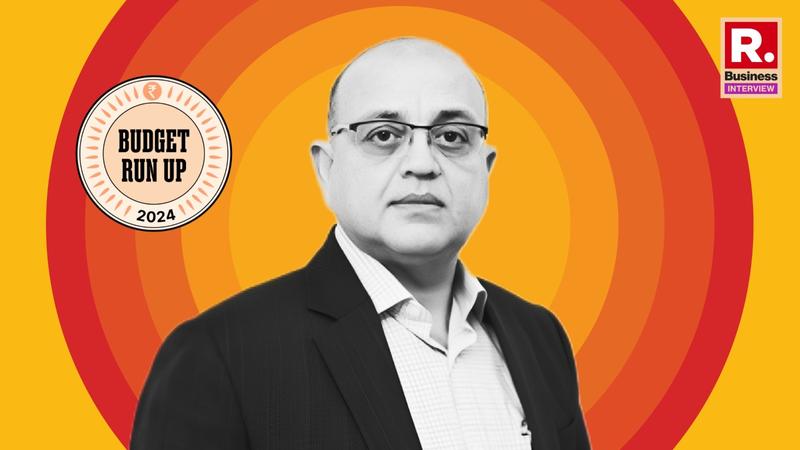Published 15:25 IST, July 16th 2024
Union Budget: Hope for measures to take India’s growth story into virtuous cycle, says ASSOCHAM
Hopeful that FM would be taking the path of fiscal consolidation, keeping the fiscal deficit within target, says Deepak Sood, Secretary General ASSOCHAM.

Pre-Budget expectations: From the farm sector to Micro, Small and Medium Enterprises (MSMEs) and the pharma industry, and infra, sector-specific expectations of the industry from the forthcoming Union Budget 2024-25 are huge. In an exclusive interview with Republic Business, Deepak Sood, Secretary General ASSOCHAM, says the Budget is expected to have measures to take the India growth story into a virtuous cycle with a perfect balance of robust demand and enough and efficient supply line.
Overall economic outlook
Finance Minister Nirmala Sitharaman's Budget speech is expected to give an optimistic economic outlook for the current fiscal with the hindsight advantage of the performance of the first quarter of FY2024-25.
This is going to be the fourth year in a row that India would be clocking in over 7 per cent GDP growth. The compounding impact of such a sustained rate of economic growth would be enormous across different sectors with immense spin off for job growth and buoyancy in tax revenue.
Once we are able to fix inflation, as is being done by the RBI to bring it down to the target of 4 per cent, we would soon be in a virtuous cycle of sustained growth with moderate inflation. The Budget would surely have measures to take the India growth story into a virtuous cycle with a perfect balance of robust demand and enough and efficient supply line.
Fiscal policy and tax reforms
As we have been emphasising, we are confident that the Finance Minister would be taking the path of fiscal consolidation, keeping the fiscal deficit within the target of 5.1 per cent of GDP while quality of expenditure would remain focussed on building human and physical infrastructure.
Almost one-fifth of the budget spend going for capital expenditure year after year would bring in several competitive advantages to the Indian economy. With better rail and road networks, accompanied by modern ports, there would be a major improvement in cost and efficiency of the logistics.
The tax reforms and rationalisation should further boost consumption demand and investment through tax incentives. Increase in rural expenditure along with a recent pick up in monsoon augur well for the rural demand, which was a missing link. Rural demand is now expected to gather momentum, as indicated by the feedback from the businesses engaged in the rural economy. These sectors include FMCG, tractor and other farm equipment, chemicals, fertilisers, irrigation and micro finance.
ASSOCHAM has asked for a personal income tax exemption limit to be raised to Rs 50,0000 and doubling of standard deduction to Rs 1 lakh. The twin measure would be a boon for the consumption demand from the middle class, a critical part of the economy.
Sector-specific allocations and infrastructure development
We expect several policy reforms and more measures at ease of doing business in the Budget speech across different sectors including the strategic areas of defence production, FDI rules and the startup ecosystem. Schemes like the PLI may be broadbased, sending signals to the domestic and global investors to leverage the Indian policy framework and set up global manufacturing hubs in India.
We also expect the Centre to incentivise states to improve their fiscal situations and policy changes in pragmatic labour laws and power reforms. All these measures would help fiscal consolidation both at the federal and state levels.
Infra development
For infrastructure development, the government has been at the forefront with a capex of Rs 11.1 lakh crore as provided in the interim Budget in February this year. We at ASSOCHAM expect the direction to continue while the private sector too is joining in to add to the capacity.
Support for MSMEs and startups
We expect MSMEs to get a priority in the Budget. We have suggested a dedicated working group tasked with identifying underperforming schemes related to Micro, Small, and Medium Enterprises.
Such an initiative would systematically assess the effectiveness of current programmes, pinpointing areas where interventions are falling short in supporting MSMEs. By conducting thorough evaluations and gathering empirical data, this group can recommend targeted reforms or adjustments to policies, ensuring that government initiatives align closely with the evolving needs and challenges faced by MSMEs.
In the presidential address presented to Parliament, the government’s vision for economic growth has been very well spelt out. It is heartening to note that the government would be working on the three key pillars of manufacturing, services and agriculture for realising the medium to long term ambitions.
Agriculture would require investment in logistics like warehousing, building an efficient supply chain and research for raising productivity and remunerative prices to the growers.
Updated 15:44 IST, July 16th 2024